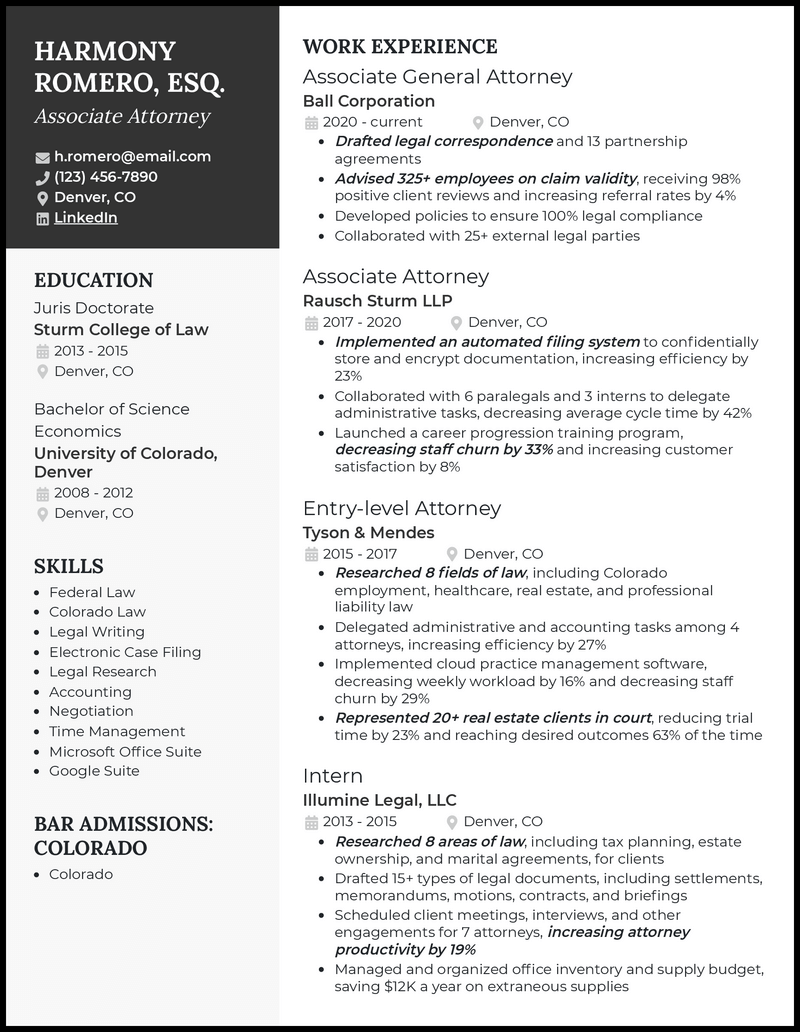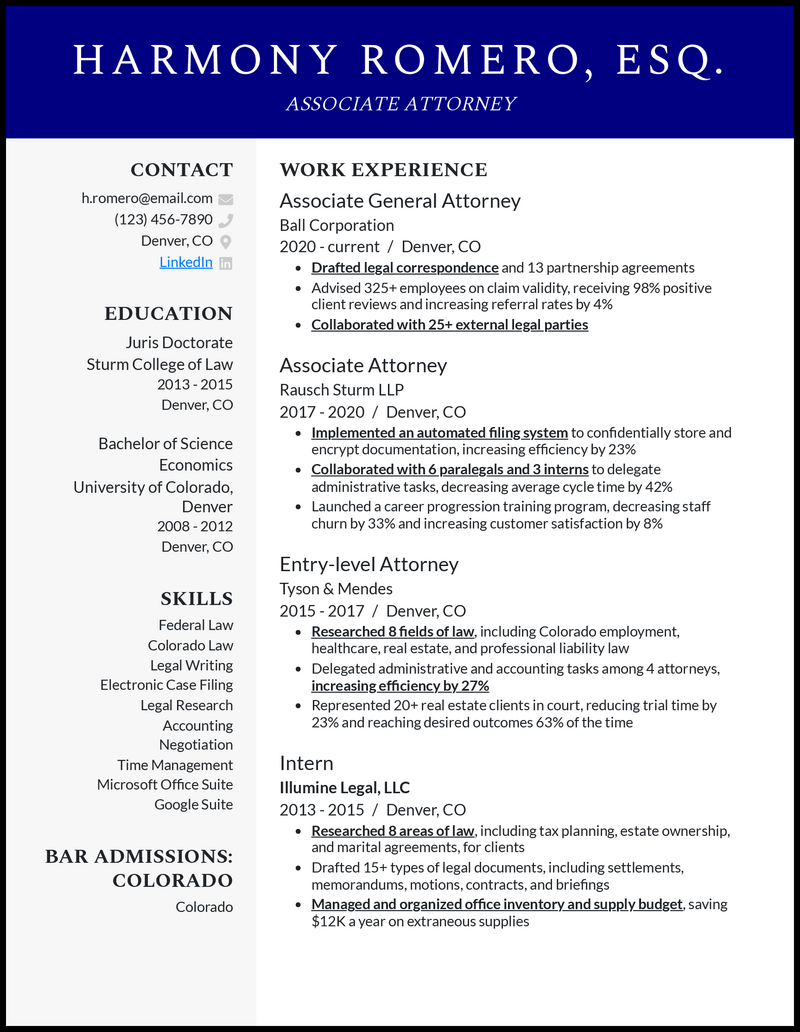You may be a recent graduate, or simply a bit new to the legal field, but you’ve gone a bit beyond entry level, too. You help paralegals and senior attorneys at your law firm with administrative tasks, court appearances, and legal document preparation.
But though you’re growing in your career, you may still feel uncertain about your resume. You may wonder what you should include to spotlight your qualifications, what resume templates are best, and how to stand out from the competition.
Don’t worry: We’ve helped plenty of associate attorneys, and we can help you, too, with our three resume templates and helpful tips. You may also want to try our AI cover letter generator to create the perfect application.
Related resume examples
What Matters Most: Your Skills & Job Experience

As an associate attorney, you’ll really want to showcase versatility in your resume’s skill section. Recruiters want to know that you can handle the many curveballs that your profession is bound to throw your way! Touch upon your interpersonal skills alongside your technical ones.
Make sure any skill you list is clearly and closely tied to your particular role: Don’t vaguely say “communication” when you could say “negotiation.” See how much more specific that sounds?
And be super technical about how you phrase your skills! Even soft skills should be highly distinct and address your abilities as clearly as possible.
Here’s what we mean:
9 top associate attorney skills
- Federal Law
- Mediation
- Oral Advocacy
- Electronic Filing
- Settlement Negotiation
- Witness Examination
- Legal Research
- MyCase
- Drafting Pleadings
Sample associate attorney work experience bullet points
Now that you’ve arranged your skill set to prove to recruiters that you have an excellent foundation, it’s time to build upon it! Specifically, it’s time to give examples of how you’ve created successful outcomes in the past for clients and the firm.
Ensure your examples reinforce your qualifications for the associate attorney role—from legal research to legal correspondence. Even if some of your past work is outside the legal field, look for skills and accomplishments that overlap, and talk about any positive impact they had that would also benefit your current role.
And don’t forget to bring in the numbers! Use quantifiable data like case success percentages or settlements to drive home your selling points.
Here are some good examples:
- Assisted with investigations and helped negotiate settlements for 47 employment disputes with an average settlement of $123,000
- Conducted due diligence, including interviewing witnesses, reviewing relevant files, and researching the law, to reduce the legal risk for clients by about 20%
- Efficiently represented 21 real estate clients in court, reducing trial times by 23% and reaching desired outcomes 71% of the time
- Managed 150+ debt collection cases, collecting 92% of delinquent payments
Top 5 Tips for Your Associate Attorney Resume
- Showcase that versatility!
- Experience in civil litigation and dealing with creditor issues? Let this work for you, not against you. For instance, if you want to work in-house for a company, you’ll handle a wide array of legal matters that crop up.
- Use your resume as a spotlight
- Look through just a few of our sample resumes, and you’ll know you can stand out among applicants with one of our templates. Your experience representing clients and filing pleadings will catch the eyes of recruiters if your template is professional, tidy, and attractive.
- Don’t forget your certifications
- Yes, recruiters know the certifications required to practice law in your state. But their goal is to weed out unqualified candidates. Don’t eliminate yourself from a callback for an interview because you didn’t list your immigration law specialist (California) or the bankruptcy specialist (issued by the American Board of Certification).
- Think about the job description
- Tailor your resume’s work experience and skills to the attorney job ad. You may be adept at using LawLogix for immigration cases, but if you’re applying to work in family law, that’s probably irrelevant.
- Slim down your bullet points
- You don’t have room to ramble, so ensure your experience points don’t exceed three lines. Stick with key info, like what metrics you improved with your due diligence or negotiation skills and some brief context about why you did it.
Yes. But if you ran out of room to discuss how you helped draft trusts and estate documents, represented adoptive parents in family law, or researched personal injury law (or whatever your niche), these kinds of stories make good fuel for your associate attorney cover letter.
Your degrees are similar to your experiences in that they don’t have to be strictly about litigation to bolster your credibility! Include any degrees in business, accounting, economics, software, or other analytical areas—after your Juris Doctorate, of course.
Some employers request these. Even if they don’t, these testimonials boost your credibility when a respected colleague backs up the time you uncovered relevant evidence in a case that supported your client or when you learned the key to negotiating settlements from observing the senior attorney.








